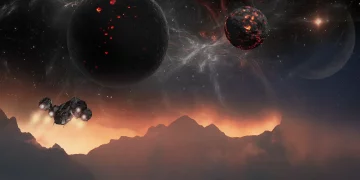In a world where every inch of space seems to have been mapped, cataloged, and explored, the question arises: what lies beyond the known horizons? Is there still unexplored territory left, or has humanity finally touched the edge of the possible? To understand what lies beyond the known, we must journey through the lenses of science, philosophy, and imagination—where the boundaries of the known blur, and the mysteries of the universe beckon.
The Expanding Universe: Space, Time, and Beyond
In the vastness of space, the unknown is not just a philosophical abstraction—it is a very real and physical reality. When astronomers look up at the sky, they observe an ever-expanding universe. The discovery that the universe is expanding, led by the work of Edwin Hubble in the 1920s, fundamentally changed our understanding of reality. However, this expansion also opens the door to deeper questions: What lies beyond the observable universe?
To grasp this, we must understand the concept of the “observable universe.” The observable universe is the region of space from which light has had enough time to reach Earth since the Big Bang. This region extends roughly 46 billion light years in every direction. However, beyond this observable region lies what is known as the “unobservable universe.”
The concept of the unobservable universe hints at the existence of regions of space that are fundamentally inaccessible to us due to the limitations of light-speed travel. What might exist beyond this horizon remains an enigma. It could be more of the same—distant galaxies, dark matter, or even entirely unknown structures of cosmic origin. Or it could be something more radical—a boundary where the laws of physics as we know them no longer apply, a place where space and time break down completely.
Black Holes: Portals to the Unknown

Perhaps no other phenomenon in the universe captures our imagination and curiosity like black holes. These mysterious regions of space warp both time and matter in ways that seem to defy the laws of physics. The idea that a black hole is a “door” to another universe or dimension has been posited by many scientists, particularly those exploring the realm of quantum mechanics.
The core mystery of black holes lies in their singularity—the point at the center where gravitational forces are so intense that they crush all matter into a zero-volume point with infinite density. This is where our current understanding of physics breaks down. No theory currently explains what happens to information, matter, or light that falls into a black hole, leading to the famous “information paradox” proposed by Stephen Hawking.
Is it possible that black holes are not simply destructive forces, but gateways to other realms of existence? Could they be linked to parallel universes, where time flows differently or the laws of nature diverge? Some theoretical physicists speculate that black holes could even be linked to wormholes, shortcuts through space-time that connect distant parts of the universe, or possibly other universes entirely. But for now, the answer to what lies beyond the event horizon of a black hole remains one of the most profound mysteries of modern science.
The Quantum Realm: The Fabric of Reality
When we zoom in from the cosmic scale to the microscopic, we enter the realm of quantum mechanics—a strange and often counterintuitive domain where particles behave in ways that seem to defy all common sense. The question of what lies beyond the known horizon takes on a new dimension in quantum mechanics, where phenomena like wave-particle duality, quantum entanglement, and uncertainty blur the lines between certainty and possibility.
Quantum physics challenges everything we know about the universe. At the quantum level, particles can exist in multiple states at once, a phenomenon known as superposition. In this bizarre domain, the concept of a “known” horizon becomes difficult to define. What we perceive as reality may be merely a limited window into a much larger and stranger truth.
The idea of parallel universes, or the “multiverse,” is another speculative theory that arises from quantum mechanics. According to this theory, every decision, every event, could spawn a new universe, leading to an infinite number of realities existing alongside our own. While we have no direct evidence of these alternate universes, the theoretical framework of quantum mechanics leaves open the possibility that the boundaries of our understanding are far more fluid and expansive than we imagine.
The Philosophy of the Unknown
Beyond the scientific questions, there is a deeper, more philosophical inquiry into what lies beyond the known. Human beings are inherently curious creatures, driven by the desire to explore, understand, and make sense of the world around them. But as our knowledge expands, so too does the recognition of the limits of that knowledge. We are left to confront the paradox of knowledge itself: the more we know, the more we realize how much remains unknowable.

Philosophers have long grappled with the idea of the unknown. The ancient Greek philosopher Socrates famously said, “I know that I am intelligent, because I know that I know nothing.” This admission of ignorance in the face of vast knowledge was not seen as a defeat, but as an acknowledgment of the inherent limitations of human understanding.
In the modern world, this philosophical perspective resonates in the face of ongoing scientific exploration. As we push the boundaries of our knowledge into the realms of quantum mechanics, black holes, and dark matter, we are reminded that for every answer we uncover, new questions emerge. The frontier of the unknown is not a destination, but an ongoing process—an eternal invitation to look beyond what we know and embrace the mystery.
The Role of Imagination in Exploring the Unknown
While science gives us tools to probe the unknown, it is often our imagination that fuels the quest for discovery. From ancient myths of the afterlife to modern science fiction, human imagination has always sought to envision what lies beyond the known horizon.
In literature and art, the unknown is portrayed as a realm of limitless potential, where the ordinary laws of existence are bent and broken. Writers like H.G. Wells and Arthur C. Clarke imagined technologies and discoveries that were once deemed impossible, but which, in hindsight, now seem prophetic. In these imagined worlds, the horizon is not a limit but an invitation—a place where human curiosity and innovation can unlock the unimaginable.
Similarly, the future of exploration is not only shaped by the rigorous methods of science, but by the visionaries who dare to imagine what could be possible. Elon Musk’s ventures into space with SpaceX and the drive to colonize Mars are not just based on scientific data—they are deeply influenced by a belief in the potential of humanity to overcome the limits of the known and to reach for something greater. The unknown is not an obstacle; it is a frontier.
The Limits of Human Knowledge
So, what lies beyond the known horizon? The answer may be that we will never fully know. With each new discovery, the horizon expands, and we realize that the universe is even larger and more mysterious than we could have imagined. Whether in the farthest reaches of space, the deepest corners of quantum mechanics, or the uncharted territories of human experience, the unknown remains a driving force for exploration and discovery.
As technology advances and our understanding deepens, the edges of the known may continue to stretch outward. However, there will always be a portion of the unknown that eludes us—a horizon forever shifting with the expansion of our knowledge. The very existence of the unknown is what gives meaning to our pursuit of knowledge, pushing us to ask better questions, to seek more answers, and to expand our horizons as far as they can go.























